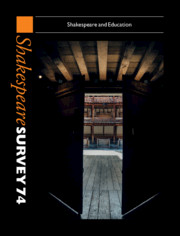Book contents
- Shakespeare Survey 74
- Shakespeare Survey
- Shakespeare Survey 74
- Copyright page
- Editor’s Note
- Contributors
- Contents
- Illustrations
- Whither Goest Thou, Public Shakespearian?
- Teaching Shakespeare in a Time of Hate
- Playful Pedagogy and Social Justice: Digital Embodiment in the Shakespeare Classroom
- Digital Resources, Teaching Online and Evolving International Pedagogic Practice
- Teaching Shakespeare with Performance Pedagogy in an Online Environment
- PPE for Shakespearians: Pandemic, Performance and Education
- ‘In India’: Shakespeare and Prison in Kolkata and Mysore
- Shakespeare for Cops
- Younger Generations and Empathic Communication: Learning to Feel in Another Language with Shakespeare at the Silvano Toti Globe Theatre in Rome
- Shakespeare in Nineteenth-Century Bengal: An Imperative of ‘New Learning’
- Forging a Republic of Letters: Shakespeare, Politics and a New University in Early Twentieth-Century Portugal
- Cultural Inclusivity and Student Shakespeare Performances in Late-Colonial Singapore, 1950–1959
- Using Performance to Strengthen the Higher Education Sector: Shakespeare in Twenty-First-Century Vietnam
- Counterpublic Shakespeares in the American Education Marketplace
- Taking Love’s Labour’s Lost Seriously
- The Thyestean Language of English Revenge Tragedy on the University and Popular Stages
- Going to School with(out) Shakespeare: Conversations with Edward’s Boys
- Intimacy and Schadenfreude in Reports of Problems in Early Modern Productions
- The True Tragedy as a Yorkist Play? Problems in Textual Transmission
- Henry VIII and Henry IX: Unlived Lives and Re-written Histories
- ‘And His Works in a Glass Case’: The Bard in the Garden and the Legacy of the Shakespeare Ladies Club
- Hamlet and John Austen’s Devil with a (Dis)pleasing Shape
- Shakespeare, #MeToo and his New Contemporaries
- ‘While Memory Holds a Seat in this Distracted Globe’: A Look Back at the Arden Shakespeare Third Series (1995–2020)
- Shakespeare Performances in England, 2020
- The Year’s Contribution to Shakespeare Studies
- ABSTRACTS OF ARTICLES IN SHAKESPEARE SURVEY 74
- Index
Shakespeare in Nineteenth-Century Bengal: An Imperative of ‘New Learning’
Published online by Cambridge University Press: 28 August 2021
- Shakespeare Survey 74
- Shakespeare Survey
- Shakespeare Survey 74
- Copyright page
- Editor’s Note
- Contributors
- Contents
- Illustrations
- Whither Goest Thou, Public Shakespearian?
- Teaching Shakespeare in a Time of Hate
- Playful Pedagogy and Social Justice: Digital Embodiment in the Shakespeare Classroom
- Digital Resources, Teaching Online and Evolving International Pedagogic Practice
- Teaching Shakespeare with Performance Pedagogy in an Online Environment
- PPE for Shakespearians: Pandemic, Performance and Education
- ‘In India’: Shakespeare and Prison in Kolkata and Mysore
- Shakespeare for Cops
- Younger Generations and Empathic Communication: Learning to Feel in Another Language with Shakespeare at the Silvano Toti Globe Theatre in Rome
- Shakespeare in Nineteenth-Century Bengal: An Imperative of ‘New Learning’
- Forging a Republic of Letters: Shakespeare, Politics and a New University in Early Twentieth-Century Portugal
- Cultural Inclusivity and Student Shakespeare Performances in Late-Colonial Singapore, 1950–1959
- Using Performance to Strengthen the Higher Education Sector: Shakespeare in Twenty-First-Century Vietnam
- Counterpublic Shakespeares in the American Education Marketplace
- Taking Love’s Labour’s Lost Seriously
- The Thyestean Language of English Revenge Tragedy on the University and Popular Stages
- Going to School with(out) Shakespeare: Conversations with Edward’s Boys
- Intimacy and Schadenfreude in Reports of Problems in Early Modern Productions
- The True Tragedy as a Yorkist Play? Problems in Textual Transmission
- Henry VIII and Henry IX: Unlived Lives and Re-written Histories
- ‘And His Works in a Glass Case’: The Bard in the Garden and the Legacy of the Shakespeare Ladies Club
- Hamlet and John Austen’s Devil with a (Dis)pleasing Shape
- Shakespeare, #MeToo and his New Contemporaries
- ‘While Memory Holds a Seat in this Distracted Globe’: A Look Back at the Arden Shakespeare Third Series (1995–2020)
- Shakespeare Performances in England, 2020
- The Year’s Contribution to Shakespeare Studies
- ABSTRACTS OF ARTICLES IN SHAKESPEARE SURVEY 74
- Index
Summary
Wherever English language, literature and culture have travelled in this world, it has been Shakespeare who received the greatest adulation. Bengali literature too was not divorced from such an activity. It was quite natural that Bengali literature adopted the subject, content and style of Shakespeare as evidenced in the schema of world literature. However, in the context of Bengal, the assimilation was not restricted to aspects of dramatic forms only, and mediated beyond literary imagination to engage into a deeper level of political and cultural discourse. While nineteenth-century Bengal evidenced widespread changes in intellectual temperament leading to a heightened intellectual ferment and creativity, it also resulted in a restructuring and reshaping of imported ideas, thereby evolving a new indigenous culture, which gave Bengal a distinctive identity. The inclination for an education in the English language among the middle classes eager to take advantage of knowing the language and acquiring the culture of the colonial rulers, along with a rapidly growing print culture, led to a growing demand for Shakespeare’s works, which at least initially, captured the imagination of Bengalis as a repository of Western culture.
- Type
- Chapter
- Information
- Shakespeare Survey 74Shakespeare and Education, pp. 139 - 150Publisher: Cambridge University PressPrint publication year: 2021

